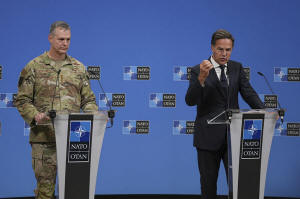NATO flexes its muscles and bulks up defenses on its eastern flank to
ward off Russia
[September 13, 2025]
By CLAUDIA CIOBANU
WARSAW, Poland (AP) — NATO said Friday it's bulking up its defensive
posture on its eastern flank bordering Belarus, Russia and Ukraine with
new equipment to deter potential Russian aggression following an
incursion by Russian drones into Polish territory.
The alliance's supreme commander in Europe said a new operation, dubbed
Eastern Sentry, will add equipment from France, Denmark, Germany and the
U.K. to its existing air and ground-based defenses. “The key to this is
an entirely new defense design,” U.S. Gen. Alexus Grynkewich told
reporters at the alliance’s Brussels headquarters.
French Rafale fighter jets, Danish F-16s, a frigate and ground-based
defense systems have been pledged for the operation. Grynkewich said the
additional resources will enable the alliance to “plug gaps in the line”
and concentrate forces wherever they're needed while improving
communications across NATO's entire eastern flank.
Poland’s Defence Minister Wladyslaw Kosiniak-Kamysz hailed the operation
in a post on X as “active deterrence and readiness to defend wherever
needed.”
Multiple Russian drones crossed into Poland on Wednesday, prompting NATO
to send fighter jets to shoot them down and underlining long-held
concerns about Russia’s three-year war in neighboring Ukraine expanding.
Russia said it did not target Poland and Moscow’s ally Belarus said the
drones went astray because they were jammed, but European leaders have
expressed certainty that the incursions were a deliberate provocation by
Russia.
Polish Prime Minister Donald Tusk dismissed U.S. President Donald
Trump’s suggestion that the drone incursion into Poland may have been a
mistake.
“We would also wish that the drone attack on Poland was a mistake,” Tusk
wrote on X. “But it wasn’t. And we know it.”
His foreign minister, Radek Sikorski, said anyone suggesting the drone
incursion was accidental is a “willing accomplice” to the spreading of
Russian propaganda.
European leaders announce measures to deter Russia
Earlier Friday, French President Emmanuel Macron said he would deploy
three Rafale fighters to Poland, while Britain unveiled fresh sanctions
on Russia’s oil revenues and war machine.
“The security of the European continent is our top priority. We will not
yield to Russia’s growing intimidation,” Macron posted on X. He said the
deployment was discussed with both NATO Secretary-General Mark Rutte and
British Prime Minister Keir Starmer.

The new measures announced by Britain on Friday included bans on 70
vessels that the U.K. says are part of Russia’s “shadow fleet” that
transports Russian oil in defiance of sanctions. Some 30 individuals and
companies — including Chinese and Turkey-based firms — also were
sanctioned for their part in supplying Russia with electronics,
chemicals, explosives and other weapons components.
Denmark's Foreign Minister Lars Løkke Rasmussen pledged expanded
cooperation between the Danish and Ukrainian defense industries.
Rasmussen said after talks with Ukrainian counterpart Andrii Sybiha that
his country aims to increase its defense production in Ukraine and
encourage more Ukrainian companies to set up shop in Denmark.
Britain stands with Kyiv
British Foreign Secretary Yvette Cooper made her first trip to Kyiv on
Friday after her appointment a week ago following a Cabinet shake-up by
Starmer.
Cooper said her visit is a demonstration of solidarity with Ukraine,
which she said has seen a massive increase in Russian drone attacks in
recent months. In July, there was a tenfold increase over the same month
last year, she said.
“The UK will not stand idly by as Putin continues his barbaric invasion
of Ukraine,” Cooper said, noting what she said was the Russian
president’s “complete disregard for sovereignty” by sending drones into
NATO airspace.
“International action to increase economic pressure on Russia and to cut
off critical cash flows which he desperately needs to pay for this
illegal war is vital.”
Reflecting Britain's support for Ukraine, Prince Harry made a surprise
visit to Kyiv where he met with wounded service members on Friday.
Sikorsky, the Polish foreign minister, was also visiting Kyiv on Friday.
Sybiha posted on X that they would discuss “shared security, Ukraine’s
EU and NATO accession, and pressure on Moscow.” Meanwhile, Poland's
Defense Ministry said it will work with Ukraine to train personnel on
anti-drone defense.
[to top of second column]
|

NATO Secretary General Mark Rutte, right, and Supreme Allied
Commander Europe (SACEUR), General Alexus G. Grynkewich address the
media at NATO headquarters in Brussels, Friday, Sept. 12, 2025. (AP
Photo/Virginia Mayo)

US stands by NATO allies
Wednesday’s Russian drone incursion into Polish airspace has compelled
NATO allies to take a closer look at the means at their disposal to
counter any further threats.
At an emergency U.N. Security Council meeting on the drone incursions,
acting U.S. Ambassador Dorothy Shea said the "United States stands by
our NATO allies in the face of these alarming airspace violations … and
rest assured, we will defend every inch of NATO territory.”
She said Russia's intensified bombing campaign since Trump and Russian
President Vladimir Putin met in Alaska last month and its violation of
Polish airspace “intentionally or otherwise show immense disrespect for
good-faith U.S. efforts to bring an end to this conflict.”

Speaking before the meeting, Poland’s Deputy Foreign Minister Marcin
Bosacki said Russia’s “flagrant violation” of international law and the
U.N. Charter and “reckless actions” bring the region “closer to conflict
than at any time in recent years.”
Reading a statement on behalf of the European Union and more than half a
dozen other countries, including the U.S. and U.K., Bosacki called the
incursions a “profoundly disrespectful” provocation and called on Russia
to immediately end its war on Ukraine.
He added that his country is pleased "so many countries recognize this
threat as much as Poland does.”
Also Friday, Russia stoked European unease as it began a long-planned
joint military exercise with Belarus aiming to showcase close defense
ties between Moscow and Minsk, as well as Russia’s military might.
Kremlin spokesperson Dmitry Peskov said talks to end the war were
currently on “pause,” even though channels of communication remain open.
“One cannot simply put on rose-tinted glasses and expect that the
negotiation process will yield lightning-fast results,” Peskov said.
“The Russian side remains ready to follow the path of peaceful
dialogue.”
Ukrainian President Volodymyr Zelenskyy repeated that neither promises
of renewed trade nor territorial concessions will stop Russia until it
realizes that its resources for waging war are depleted.
“The Russian war machine will only stop when it runs out of fuel,”
Zelenskyy told a conference Friday. “And Putin will start to stop it
himself when he feels, truly, that the resources for the war are running
low.”
Ukrainian drones strike Russian oil port
Russian air defenses downed 221 Ukrainian drones over more than a dozen
Russian regions early Friday, Russia's Defense Ministry said. The attack
involved some of the highest numbers of drones reported by the Russian
military, but there have been no reports of any significant damage.
A Ukrainian security official said drones struck Russia’s largest oil
port on the Baltic Sea in Primorsk, including oil pumping stations
conveying oil to the Ust-Luga port terminal.
The official said Primorsk is a key hub for Russia’s “shadow fleet" of
sanction-busting tankers, which earn Moscow approximately $15 billion
annually.

The official spoke to The Associated Press on Friday on condition of
anonymity because he was not authorized to publicly discuss missions.
____
Associated Press writers Edith M. Lederer at the United Nations; Lorne
Cook in Brussels; Jill Lawless in London; John Leicester in Paris; Ilia
Novikov in Kyiv and Katie Marie Davis in Manchester, England,
contributed to this report.
All contents © copyright 2025 Associated Press. All rights reserved |